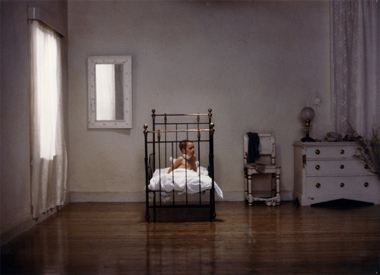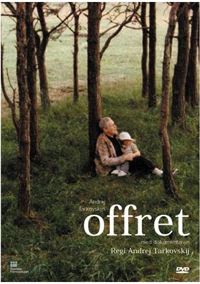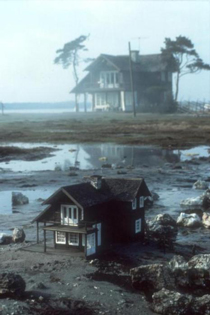
 |
|
|
|
In Chris Marker's documentary One Day in the Life of Andre Arsenevich, a Soviet artist appears on camera to eulogize Andre Tarkovsky, stating how the filmmaker was revered and respected in his homeland. The cruel irony is that Tarkovsky had been in exile from the Soviet Union for years, and the authorities refused to let his family and son visit him until he was on his deathbed. 
Tarkovsky's final film The Sacrifice was produced in exile in Sweden, with an international cast. Star Erland Josephson had made Nostalghia with Tarkovsky in Italy several years earlier. Given an inspired collaborator in cinematographer Sven Nykvist, Tarkovsky's film in some ways resembles an Ingmar Bergman tale of isolated introspection. Marked with inordinately long takes, the film shows its director's fascination with unbroken pieces of reality affixed to film, where 'film time' becomes 'real time'. Besides the lengthy scenes of dialogue spaced out by long pauses, and the overall marathon length, The Sacrifice is distinct from Bergman in its obsessive study of religious ideas: the meaning of a planted tree, the intense scrutiny of a religious painting, and the main character's relationship to his faith. Chris Marker stated that Tarkovsky's films became more pure as he left generic conventions behind and concentrated on his core themes. Audiences looking for something beyond expressions of an artist's personal philosophy felt differently. The science fiction epic Solaris remains the film that Tarkovsky is best known for. It chooses to abandon its source novel's narrative in favor of its director's humanistic exploration of personality and memory. The director's most impressive film Andrei Rublev works equally as well as an historical-religious document. Like Solaris and Stalker, The Sacrifice hangs its story on a science-fiction premise, but reverses course, genre-wise, into an interior exploration. 
The story covers less than a 24-hour day. Retired intellectual Alexander (Erland Josephson) enjoys his small son before and during a birthday visit from his adult son and daughter. His wife, an actress who gave up her career long ago, is upset that her son, a doctor, plans to relocate to Australia. The local postman Otto also arrives to celebrate. Alarming news from the radio coupled with the sound of roaring jet flyovers herald the beginning of World War III, which sends the extended household into fits of hysteria and depression. Alexander falls into a deep philosophical meditation, in which he promises God to commit a destructive act of sacrifice, if only the world and his tiny son will be saved. In the information blackout, Otto becomes convinced that the local cleaning woman Maria is a witch, and that Alexander can save the world by sleeping with her. In the morning, when it seems that all is going to be okay, Alexander decides that the time has come for him to keep faith with God by fulfilling his side of his bargain. The Sacrifice is steeped in the nature of religious faith and man's relationship to his deity. Alexander's sacrifice can be regarded as an authentic offering of a righteous man, whether or not any 'bargain' was struck with God. Compared to the Biblical Job, Alexander's sacrifice is a pittance, but neither is it hollow, considering how it will compromise his waning years. It's comparable to the Catholic phenomenon of a contract with God, as visited by author Graham Greene in End of the Affair, where one promises in prayer to make a personal sacrifice should God grant one's wish. Alexander's idea of "petitioning the Lord with prayer" is something people do every day, in earnest or simply as an expression of fervent desire: please, please don't let anything happen to my spouse/lover/children. Alexander simply accepts this God-human relationship as a real responsibility. A non-religious person might well view this notion of a personal conduit to one's maker as the height of hubris. 
Alexander speaks at length (in ultra-slow Tarkovsky Time) on the need for spirituality in the modern world. The idea is that the threat of an apocalyptic war is directly related to our lack of spirituality. I'd certainly agree with that, so long as spirituality is not equated with organized religion. Tarkovsky may seem insufferably deep dish to the average movie fan, but it is plainly obvious that the aim of his feature films is to elevate film to an art form. The Sacrifice borrows a science fiction concept but Chris Marker is correct in the sense that it is uninterested in the end of the world as a film subject. We're not even certain that the war threat is real, as only one shot, a down angle of people running in panic in a courtyard, could be construed as a possible representation of a real attack. But the shot tilts downward, and appears in an abstract context; it's not all that different than the several tilting shots that examine a particular religious painting. Tarkovsky doesn't resolve the war scare with an "all clear" report on the radio, so we're not certain why the characters go for a walk the next morning as if all will be okay. The things that worry us seem to be side issues: when Alexander commences his act of sacrifice, his little son's location has not been firmly established. We begin to fear for a horror scenario like the one that ends the ban-the-bomb nuclear warning movie Ladybug Ladybug (1963). 
That impressive eight-minute take near the end of the film achieves the we-are-there immediacy Tarkovsky was after. Figures move across the dawn landscape, staggering, tearing at their hair, trying to subdue Alexander as they take in what he has done. The shot is not a case of cinematic ostentation, but a well-reasoned application of Tarkovsky's ideas of what film should be... extended pieces of real time, not montage. Kino International's Blu-ray of The Sacrifice is the payoff release for Tarkovsky fans, as previous video versions haven't received complimentary notices. This new Remastered Edition darkens some scenes in a way that should please knowledgeable viewers upset with careless earlier transfers. The High Definition image is especially welcome, as so many scenes play out in wide shots where small details in the screen are of utmost importance. A second Standard-Def disc contains the Swedish Film Institute's 1988 docu Directed by Andrei Tarkovsky, based largely on the shooting of The Sacrifice. Sven Nykvist and director Tarkovsky communicated through interpreters but also in Italian, as both had worked with Italian crews on previous occasions. Nykvist has much of interest to say about his Russian colleague: in a 1997 interview 1 he remarked on how both Tarkovsky and Roman Polanski had developed set notions based on "ingrained rules" learned in state film schools. Nykvist's reportage on the filming of the all-important long-take "sacrifice" scene is highly emotional -- the first attempt was a failure, and doing it a second time was outside the reach of the film's budget. In the end, both the cameraman and the star Erland Josephson forfeited their salaries to see Tarkovsky's film finished as he wanted it. A scene from Chris Marker's One Day in the Life of Andre Arsenevich shows the cameraman bringing a videotape of a timed version of the film to the director's hospice bed, where he was awaiting his own end.
On a scale of Excellent, Good, Fair, and Poor,
The Sacrifice Blu-ray rates:
Footnote:
1. Recommended reading: Nostalghia.com's article Sven Nykvist: On the Shooting of The Sacrifice
Reviews on the Savant main site have additional credits information and are often updated and annotated with reader input and graphics. Also, don't forget the 2010 Savant Wish List. T'was Ever Thus.
Review Staff | About DVD Talk | Newsletter Subscribe | Join DVD Talk Forum |
| ||||||||||||||||||